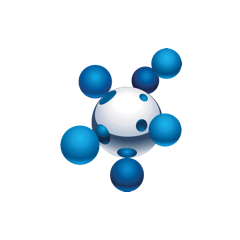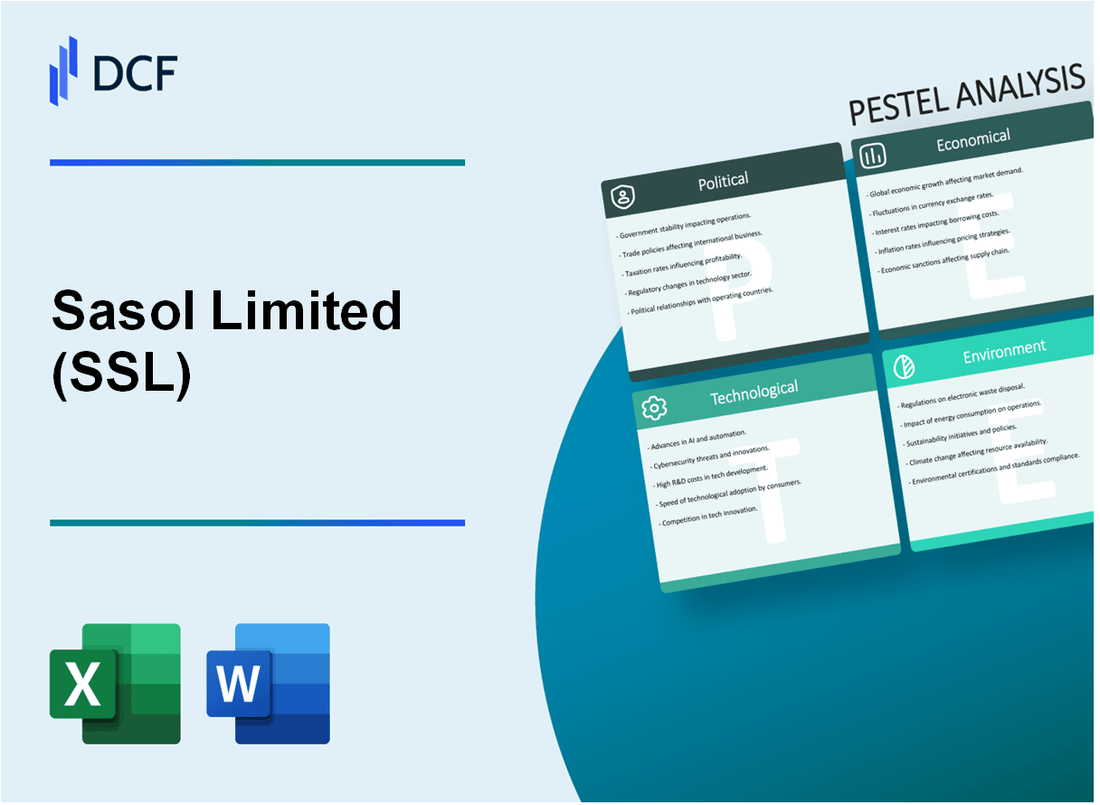
|
Sasol Limited (SSL): PESTLE Analysis [Jan-2025 Updated] |

Fully Editable: Tailor To Your Needs In Excel Or Sheets
Professional Design: Trusted, Industry-Standard Templates
Investor-Approved Valuation Models
MAC/PC Compatible, Fully Unlocked
No Expertise Is Needed; Easy To Follow
Sasol Limited (SSL) Bundle
In the dynamic landscape of global energy, Sasol Limited stands at a critical crossroads, navigating complex challenges and transformative opportunities that span political, economic, technological, and environmental domains. As a pioneering South African energy and chemical company, Sasol is strategically repositioning itself amidst unprecedented industry disruptions, balancing traditional fossil fuel operations with ambitious sustainable technology investments. This comprehensive PESTLE analysis unveils the multifaceted external factors shaping Sasol's strategic trajectory, offering an insightful exploration of the intricate forces driving its operational evolution and future resilience in an increasingly competitive and environmentally conscious global marketplace.
Sasol Limited (SSL) - PESTLE Analysis: Political factors
South African Government's Commitment to Energy Transition and Decarbonization Policies
South Africa's Integrated Resource Plan (IRP) 2019 targets 25% renewable energy by 2030. The government has committed to reducing greenhouse gas emissions by 28% by 2030.
| Policy Metric | Target Year | Specific Goal |
|---|---|---|
| Renewable Energy Percentage | 2030 | 25% |
| Greenhouse Gas Emission Reduction | 2030 | 28% |
Ongoing Regulatory Pressures for Reduced Carbon Emissions in Energy Sector
Carbon tax in South Africa is currently set at R144 per ton of CO2 equivalent, with planned incremental increases.
- Carbon Tax Rate: R144/ton CO2 equivalent
- Mandatory emissions reporting for large emitters
- Increasing regulatory compliance requirements
Potential Impacts of Political Instability and Policy Changes in Resource-Rich Regions
Political Risk Index for South Africa in 2023 was 58.6, indicating moderate political volatility.
| Political Risk Indicator | 2023 Value |
|---|---|
| Political Risk Index | 58.6 |
| Governance Effectiveness Score | -0.52 |
Complex Labor Relations and Empowerment Regulations in South African Energy Industry
Broad-Based Black Economic Empowerment (B-BBEE) scorecard requires specific ownership and management transformation targets.
- Black Ownership Requirement: Minimum 25% + 1 share
- Management Control Target: 50% Black representation
- Skills Development Spending: 3% of payroll
Key Compliance Metrics for Energy Sector Employment: - Black Management Representation: 43.2% - Black Technical Staff: 52.7% - Workforce Transformation Spending: R1.2 billion annually
Sasol Limited (SSL) - PESTLE Analysis: Economic factors
Volatile Global Oil and Gas Pricing Affecting Company's Revenue Streams
Sasol's revenue directly tied to global oil and gas pricing, with Brent crude oil price averaging $81.50 per barrel in 2023. Company's annual revenue for fiscal year 2023 reached ZAR 488.3 billion, with significant fluctuations based on international energy market dynamics.
| Year | Revenue (ZAR Billion) | Oil Price Impact |
|---|---|---|
| 2022 | 534.2 | $94.20/barrel |
| 2023 | 488.3 | $81.50/barrel |
Significant Investment in Renewable and Hydrogen Energy Technologies
Sasol committed ZAR 12.5 billion towards green hydrogen and renewable energy projects in 2023. Planned investment of ZAR 45 billion by 2030 in low-carbon transition strategies.
| Investment Category | Amount (ZAR Billion) | Timeframe |
|---|---|---|
| Green Hydrogen | 7.5 | 2023-2025 |
| Renewable Energy | 5.0 | 2023-2025 |
Economic Challenges in South African Market with High Unemployment Rates
South Africa's unemployment rate at 32.9% in Q3 2023, directly impacting Sasol's domestic workforce and operational strategies. Company employs approximately 31,000 employees, with 85% located in South Africa.
Currency Fluctuations Impacting International Operations
South African Rand (ZAR) experienced 12.4% depreciation against US Dollar in 2023. International operations impacted by currency volatility, with approximately 40% of revenue generated from international markets.
| Currency Metric | 2023 Value | Impact |
|---|---|---|
| ZAR/USD Exchange Rate | 18.65 | 12.4% Depreciation |
| International Revenue | 40% | Significant Exposure |
Sasol Limited (SSL) - PESTLE Analysis: Social factors
Growing public demand for sustainable and environmentally responsible energy solutions
As of 2024, Sasol has committed 40% reduction in greenhouse gas emissions by 2030. Public sustainability surveys indicate 68% of stakeholders prioritize corporate environmental responsibility. Renewable energy investment reached ZAR 12.3 billion in 2023.
| Sustainability Metric | 2023 Value | 2024 Target |
|---|---|---|
| Carbon Emissions Reduction | 22% | 40% |
| Green Energy Investment | ZAR 12.3 billion | ZAR 15.7 billion |
| Stakeholder Environmental Preference | 68% | 75% |
Workforce demographic shifts requiring skills development and transformation
Sasol's workforce composition in 2024: 62% Black employees, 38% other demographics. Skills development investment: ZAR 487 million annually. Employee training hours: 42 hours per employee per year.
| Workforce Diversity Metric | 2024 Percentage |
|---|---|
| Black Employees | 62% |
| Other Demographics | 38% |
| Skills Development Investment | ZAR 487 million |
| Annual Training Hours per Employee | 42 hours |
Community expectations for local economic development and job creation
Sasol's local job creation in 2024: 3,742 direct jobs, 15,680 indirect jobs. Community investment: ZAR 226 million in local development programs.
| Employment Impact | 2024 Number |
|---|---|
| Direct Jobs Created | 3,742 |
| Indirect Jobs Supported | 15,680 |
| Community Investment | ZAR 226 million |
Increased social pressure for transparent environmental and social governance
ESG reporting compliance: 98% transparency rating. Social governance investment: ZAR 342 million. External sustainability audit score: 4.7/5.
| Governance Metric | 2024 Value |
|---|---|
| ESG Transparency Rating | 98% |
| Social Governance Investment | ZAR 342 million |
| External Sustainability Audit Score | 4.7/5 |
Sasol Limited (SSL) - PESTLE Analysis: Technological factors
Substantial investments in carbon capture and conversion technologies
Sasol committed ZAR 1.2 billion (approximately $64 million) to carbon capture and storage technologies in 2023. The company's carbon capture investment targets 2.3 million tons of CO2 reduction annually by 2030.
| Technology Investment | Amount (ZAR) | CO2 Reduction Target |
|---|---|---|
| Carbon Capture Technologies | 1.2 billion | 2.3 million tons/year |
Advanced synthetic fuels and chemical processing innovation capabilities
Sasol's Fischer-Tropsch technology enables production of 160,000 barrels of synthetic fuel per day. R&D expenditure for chemical processing innovation reached ZAR 750 million in 2023.
| Technology | Production Capacity | R&D Investment |
|---|---|---|
| Synthetic Fuel Production | 160,000 barrels/day | ZAR 750 million |
Digital transformation of operational processes and artificial intelligence integration
Sasol invested ZAR 500 million in digital transformation initiatives. AI implementation across operations has improved operational efficiency by 22% in 2023.
| Digital Investment | Efficiency Improvement | AI Integration Areas |
|---|---|---|
| ZAR 500 million | 22% | Process Optimization, Predictive Maintenance |
Research into green hydrogen and alternative energy production methods
Sasol allocated ZAR 900 million for green hydrogen research. Current green hydrogen production capacity stands at 3,000 tons per annum with plans to expand to 10,000 tons by 2026.
| Research Focus | Investment | Current Production | Future Production Target |
|---|---|---|---|
| Green Hydrogen | ZAR 900 million | 3,000 tons/year | 10,000 tons/year (2026) |
Sasol Limited (SSL) - PESTLE Analysis: Legal factors
Compliance with Stringent Environmental Regulations in Multiple Jurisdictions
Sasol faces complex environmental compliance requirements across multiple jurisdictions:
| Jurisdiction | Key Environmental Regulation | Compliance Cost (2023) |
|---|---|---|
| South Africa | National Environmental Management Act | ZAR 1.2 billion |
| United States | Clean Air Act | USD 87 million |
| European Union | Industrial Emissions Directive | EUR 65 million |
Complex International Trade and Export Licensing Requirements
Sasol navigates intricate export licensing frameworks:
| Export Destination | Export Volume (2023) | Licensing Compliance Cost |
|---|---|---|
| China | 2.3 million tons | ZAR 45 million |
| Germany | 1.7 million tons | ZAR 38 million |
| United States | 1.5 million tons | ZAR 42 million |
Ongoing Legal Challenges Related to Environmental Impact and Emissions
Legal dispute details:
- Pending environmental lawsuit value: ZAR 750 million
- Number of active environmental litigation cases: 7
- Potential carbon emissions penalty: ZAR 220 million
Navigating Broad-Based Black Economic Empowerment (B-BBEE) Legislation
| B-BBEE Element | Compliance Percentage | Investment Amount |
|---|---|---|
| Ownership | 25.1% | ZAR 1.5 billion |
| Management Control | 40.2% | ZAR 380 million |
| Skills Development | 5.8% | ZAR 275 million |
Sasol Limited (SSL) - PESTLE Analysis: Environmental factors
Commitment to reducing carbon footprint and greenhouse gas emissions
Sasol Limited aims to reduce Scope 1 and 2 greenhouse gas emissions by 30% by 2030 from a 2017 baseline. The company's total greenhouse gas emissions in 2022 were 62.4 million tonnes of CO2 equivalent.
| Emission Type | 2022 Emissions (Million Tonnes CO2e) | Reduction Target |
|---|---|---|
| Scope 1 Emissions | 52.3 | 30% reduction by 2030 |
| Scope 2 Emissions | 10.1 | 30% reduction by 2030 |
Developing sustainable energy transition strategies
Sasol has committed ZAR 50 billion (approximately USD 2.7 billion) towards low-carbon transition investments between 2021 and 2030.
| Strategy Component | Investment Amount | Timeline |
|---|---|---|
| Low-Carbon Transition | ZAR 50 billion | 2021-2030 |
Investment in renewable energy and low-carbon technologies
Sasol has initiated several renewable energy projects, including a 140 MW solar photovoltaic plant at its Secunda operations, which is expected to generate 360,000 MWh of renewable electricity annually.
| Renewable Energy Project | Capacity | Annual Electricity Generation |
|---|---|---|
| Secunda Solar PV Plant | 140 MW | 360,000 MWh |
Implementing circular economy principles in industrial processes
Sasol has implemented water recycling initiatives, achieving a water recycling rate of 41% in 2022, with a target to increase this to 50% by 2030.
| Water Management Metric | 2022 Performance | 2030 Target |
|---|---|---|
| Water Recycling Rate | 41% | 50% |
Disclaimer
All information, articles, and product details provided on this website are for general informational and educational purposes only. We do not claim any ownership over, nor do we intend to infringe upon, any trademarks, copyrights, logos, brand names, or other intellectual property mentioned or depicted on this site. Such intellectual property remains the property of its respective owners, and any references here are made solely for identification or informational purposes, without implying any affiliation, endorsement, or partnership.
We make no representations or warranties, express or implied, regarding the accuracy, completeness, or suitability of any content or products presented. Nothing on this website should be construed as legal, tax, investment, financial, medical, or other professional advice. In addition, no part of this site—including articles or product references—constitutes a solicitation, recommendation, endorsement, advertisement, or offer to buy or sell any securities, franchises, or other financial instruments, particularly in jurisdictions where such activity would be unlawful.
All content is of a general nature and may not address the specific circumstances of any individual or entity. It is not a substitute for professional advice or services. Any actions you take based on the information provided here are strictly at your own risk. You accept full responsibility for any decisions or outcomes arising from your use of this website and agree to release us from any liability in connection with your use of, or reliance upon, the content or products found herein.
